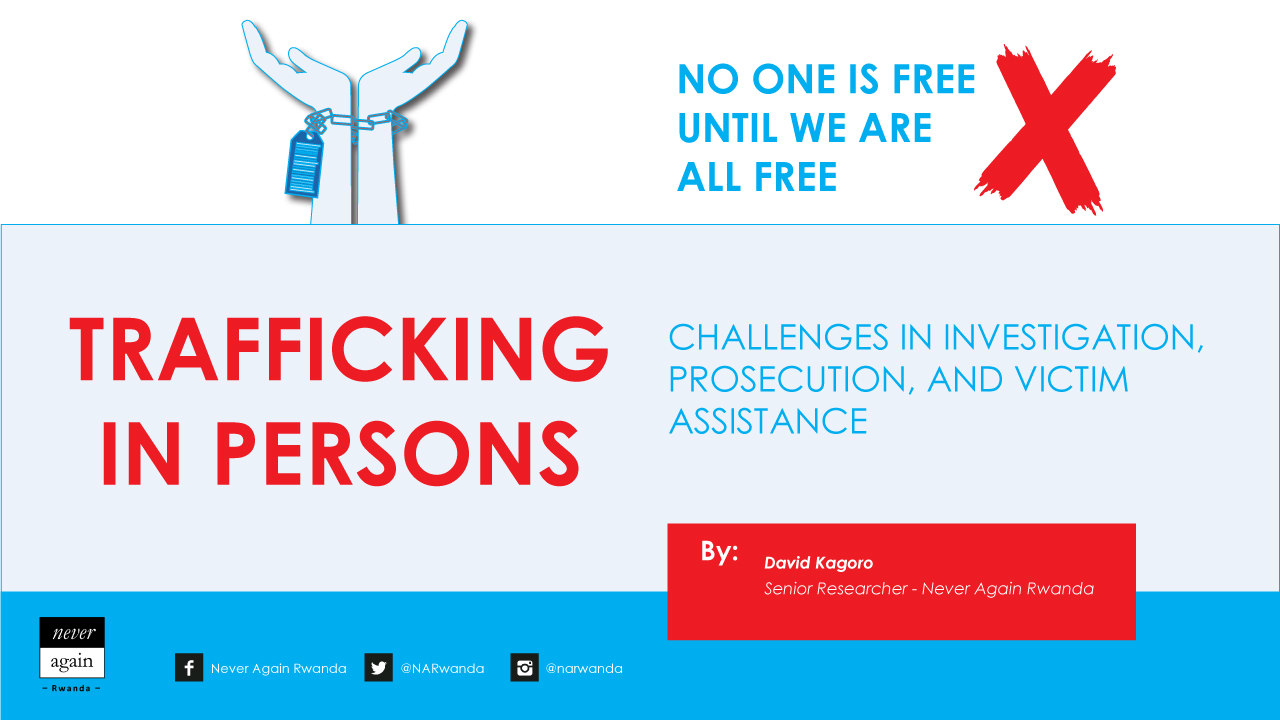The United Nations Office on Drugs and Crime (UNODC) summarizes trafficking in persons as the acquisition of people by improper means such as force, fraud, or deception, intending to exploit them. Trafficking in persons, considered a modern form of slavery, is widely prevalent across the world. According to the International Labour Organization, around 40.3 million people fell prey to this modern form of slavery in 2016 and about 25% of these victims were children.
Trafficking in persons has also been reported in Rwanda. A study conducted by Never Again Rwanda reveals that 515 victims of trafficking in persons were recorded by the Directorate General and Emigration and Immigration (DGIE) in 2017. Human trafficking is indeed a complex crime that poses unique challenges in its investigation and prosecution as well as the provision of assistance to victims.
Regarding investigating the crime of trafficking in persons, there are a number of challenges. Firstly, trafficking in persons is an organized crime that is committed secretly. This makes detecting the crime—let alone investigating it—very difficult. Secondly, the crime of trafficking in persons involves a huge amount of money and often traffickers give money to unsuspecting victims, while falsely promising more opportunities in the destination countries. Thirdly, the recruiters and victims often know each other very well and have a relationship, which creates a sense of trust among the potential victims. Furthermore, limited knowledge about the crime of trafficking in persons among the general population renders potential victims blind to the warning signs and indicators of trafficking in persons. As a result, during investigations, the victims of trafficking in persons are often initially reluctant to cooperate with investigators.
Prosecuting the crime of trafficking in persons has proven quite a challenge. According to Research conducted by Never Again Rwanda, 25% of the trafficking in persons cases received by the National Public Prosecution Authority could not make it to trial and sadly as a result, they were dropped. The overarching challenge in prosecuting the crime of trafficking in persons is insufficient evidence. Gathering evidence for the crime of trafficking in persons has proven to be a daunting task due to several reasons. To begin with, since the crime of trafficking in persons is partly transnational, in some instances the traffickers coordinate the whole operation outside the country of origin using social media platforms such as Whatsapp and Facebook. Therefore, in some cases, the prosecutors find themselves with victims of trafficking but not their traffickers.
In a bid for the investigators and prosecutors to apprehend the traffickers, they face challenges of limited or lack of cooperation with some countries, language barriers, and a discrepancy in laws and culture. One example is the Kafala system, which ties immigrant workers, especially live-in maids, to employers for the whole period of stay regardless of their employment conditions. This practice is legal in many countries in West Asia to monitor migrant labor; however, it leaves room for employers to exploit their workers.
An extra issue is the restricted information and limit of cutting-edge specialists to arrange the required proof. The research conducted by Never Again Rwanda revealed a discrepancy between the investigators and prosecutors. While the investigators gripe and express disappointment that prosecutors are letting traffickers go free, the prosecutors attest that in such cases, the proof accumulated by investigators is insufficient to warrant a trial.
Assistance to the victims of trafficking in persons, enshrined in article six of the Palermo, also poses a number of challenges. Victim assistance is diverse and involves different activities namely the provision of shelter, medical care, legal services, and material support. Considering the nature of trafficking in persons, provision of victim assistance such as mental health care, that is often needed to treat psychological trauma, requires specialized personnel and is offered over an extended period for the victims to heal.
Furthermore, victims of trafficking in persons need material support, not only to ease their reintegration back in the community, but also to prevent instances of potential double victimization where they may fall prey to trafficking again due to harsh conditions. Therefore, the biggest challenge encountered in the provision of assistance to victims of trafficking in persons is limited material and financial resources.
Combating trafficking in persons is a complex endeavor and calls for a comprehensive, multisectoral approach involving different actors including, among others, public institutions, the private sector, and the civil society. Specifically, efforts should target awareness-raising among the community, capacity building of law enforcement agencies on the crime of trafficking in persons, pooling resources to strengthen the area of victim assistance, and strengthening international cooperation regarding combating trafficking in persons.
David Kagoro
Senior Researcher – Never Again Rwanda


